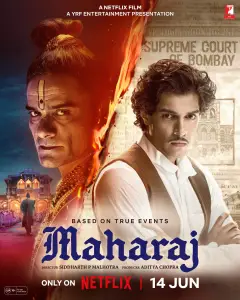Maharaj revisits a significant legal case from the past, yet falls short in evoking strong feelings regarding its delicate themes.
Set in Bombay in 1862, the central narrative revolves around Karsandas Mulji, a journalist portrayed by Junaid Khan, the son of Aamir Khan. Raised in Gujarat, Karsan was known for his inquisitive nature and reluctance to unquestioningly obey commands. By the age of 30, he had already made a name for himself as a prominent social reformer, activist, and author.
Maharaj Movie Review
Theology plays a role in facilitating sexual abuse by using holy texts written in Sanskrit, a language inaccessible to most people. The maharaj acts as the interpreter of these scriptures for the lay community, who lack the ability to question his interpretations. This situation mirrors the language barrier that existed in Catholicism until the 1960s when mass was finally allowed to be conducted in local languages instead of exclusively in Latin. The film draws attention to the similarities between the culture of abuse within Maharaj and that enabled by the Catholic Church, although it specifically portrays JJ as an individual wrongdoer rather than implicating Hinduism as a whole.

The revelation of JJ’s misconduct occurs when he becomes fixated on Karsan’s soon-to-be wife, Kishori (played by Shalini Pandey), and Karsan catches her engaging in a religious ritual. Despite feeling uneasy about JJ’s actions, it remains uncertain if she was aware of being watched by outsiders. Her strong faith prevents her from doubting the leader’s motives. It is only after Karsan ends their engagement that she begins to suspect she may have been deceived by the spiritual figure.
Read Also : Kill Movie Review
Karsan decides to expose JJ’s sexual abuse after witnessing Kishori’s mistreatment. In retaliation, JJ uses various tactics such as social coercion, intimidating witnesses, and resorting to arson. Despite facing legal threats and pressure, Karsan remains steadfast in his decision to bring the truth to light. Eventually, JJ takes legal action against Karsan for defamation, demanding an exorbitant sum in damages.
In the film Maharaj, directed by Siddharth P. Malhotra and written by Sneha Desai, Vipul Mehta, and Bernard Williams, Karsan makes bold accusations against JJ without solid evidence, leaving viewers to ponder the validity of his claims. Regrettably, the courtroom scenes lack legal intricacies and mainly serve as a backdrop for Karsan’s impassioned monologue, with occasional dramatic displays of power from JJ adding entertainment value.
In general, the movie occupies a murky middle ground where it doesn’t quite reach the emotional depths expected of a true melodrama, nor does it explore the intricacies typical of legal dramas or investigative journalism films. While undeniably enjoyable, it comes across more like a polished production tailored for television viewing.
Ahlawat embodies the deceitful JJ with flawless precision, exuding a maddening aura of confidence. Pandey portrays the deceived Kishori with empathy. Shavari Wagh makes a sudden entrance as Viraaj, an admirer of Karsan, but her attempts at comic relief seem misplaced in the narrative.
Malhotra and Yash Raj Entertainment approached the narrative of a corrupt holy man cautiously to prevent escalating tensions needlessly, leading to a film that held back its impact. Regrettably, despite their efforts, those predisposed to be upset still found reasons for anger, leaving viewers with a movie that was decent but fell short of greatness.